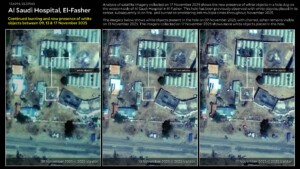Fuel crisis paralyses public transport in Sudan
The ongoing scarcity of fuel in Sudan is disrupting transportation in various parts of the country. An employee of El Jeili Refineries expects the crisis to continue.
The prices of bus tickets and transportation fares by car between towns in West Kordofan doubled or almost tripled this month.
“The fare from Abu Zabad to El Fula has risen from SDG 70 ($ 4*) to SDG 150,” the owner of a rental car told Radio Dabanga on Sunday. “The price for a seat from El Fula to El Obeid [capital of North Kordofan] has risen from SDG 120 to SDG 400.”
 Less buses in downton Khartoum because of the fuel crisis, April 22, 2018 (RD)
Less buses in downton Khartoum because of the fuel crisis, April 22, 2018 (RD)
The ongoing scarcity of fuel in Sudan is disrupting transportation in various parts of the country. An employee of El Jeili Refineries expects the crisis to continue.
The prices of bus tickets and transportation fares by car between towns in West Kordofan doubled or almost tripled this month.
“The fare from Abu Zabad to El Fula has risen from SDG 70 ($ 4*) to SDG 150,” the owner of a rental car told Radio Dabanga on Sunday. “The price for a seat from El Fula to El Obeid [capital of North Kordofan] has risen from SDG 120 to SDG 400.”
An official reported from the West Kordofan capital of El Fula that the fuel crisis is as well disrupting the work of government employees in the state.
Khartoum and Wad Madani, Kassala, Port Sudan as well as other state capitals are witnessing long queues of vehicles in front of fuel stations again.
A listener in White Nile State complained about “a significant increase in the prices of consumer goods”. He attributed the soaring prices to the risen transportation costs.
Agriculture
The continuing lack of fuel is as well threatening the upcoming agricultural season.
Earlier this month, farmers in El Gedaref and El Gezira warned for a failure of the coming agricultural season – that will start in May.
A farmer in El Abbasiya in South Kordofan told this station on Sunday that “the agricultural season will fail, if we do not get fuel next month”.

Refineries shut
An employee of El Jeili Refineries north of Khartoum that stopped operating a month ago because of annual maintenance, attributed the scarcity of fuel to the reduction of quotas of petroleum products distributed to companies.
“The crisis will most probably continue,” he told this station. “I doubt the Ministry of Oil will be able to meet the consumption needs after the government’s stocks decreased.”
In December last year, economists predicted a serious fuel crisis after the the final decommissioning of the Port Sudan refinery, and the shutdown of El Jeili refinery for maintenance in early March.
* Based on the official US Dollar rate quoted by the Central Bank of Sudan (CBoS)











 and then
and then